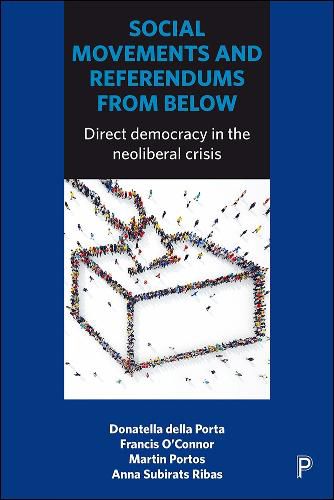Readings Newsletter
Become a Readings Member to make your shopping experience even easier.
Sign in or sign up for free!
You’re not far away from qualifying for FREE standard shipping within Australia
You’ve qualified for FREE standard shipping within Australia
The cart is loading…






Over recent years, social movements formed in response to European neoliberal austerity measures have played an increasingly important role in referendums. This is the first book to bridge the gap between social movement studies and research on direct democracy. It draws on social movement theory to understand the nature of popular mobilisation in referendums.
Co-authored by one of the world’s leading authorities on social movements, the book uses unique case studies such as the referendum on independence in Scotland, the consultations on independence in Catalonia, the Italian referendum on water, the referendum on the Troika proposals in Greece and the referendum on the debt repayment in Iceland, to illustrate the ways the social movements that formed as a consequence of the 2008 financial crash have affected the referendums’ dynamic and results. It also addresses the way in which participation from below has had a transformative impact on the organisational strategies and framing practices used in the campaigns.
Looking at general issues of democracy, as well as the political effects of neoliberalism, this topical book is ideally suited to understand the reasons for the Brexit result and will be read by a wide audience interested in social movements, referendums and democratic innovation.
$9.00 standard shipping within Australia
FREE standard shipping within Australia for orders over $100.00
Express & International shipping calculated at checkout
Over recent years, social movements formed in response to European neoliberal austerity measures have played an increasingly important role in referendums. This is the first book to bridge the gap between social movement studies and research on direct democracy. It draws on social movement theory to understand the nature of popular mobilisation in referendums.
Co-authored by one of the world’s leading authorities on social movements, the book uses unique case studies such as the referendum on independence in Scotland, the consultations on independence in Catalonia, the Italian referendum on water, the referendum on the Troika proposals in Greece and the referendum on the debt repayment in Iceland, to illustrate the ways the social movements that formed as a consequence of the 2008 financial crash have affected the referendums’ dynamic and results. It also addresses the way in which participation from below has had a transformative impact on the organisational strategies and framing practices used in the campaigns.
Looking at general issues of democracy, as well as the political effects of neoliberalism, this topical book is ideally suited to understand the reasons for the Brexit result and will be read by a wide audience interested in social movements, referendums and democratic innovation.